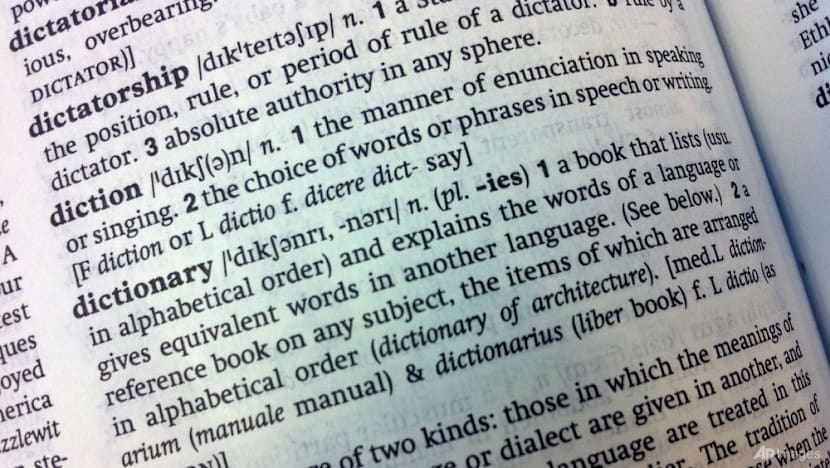Commentary: From ‘skibidi’ to ‘tradwife’, dictionary entries are never neutral
The real debate isn’t whether internet slang counts as “proper English”, but which words get preserved and which are left to vanish, says NUS Centre for Language Studies’ Daniel Chan.


This audio is generated by an AI tool.
SINGAPORE: When the Cambridge Dictionary announced its latest entries, which included “skibidi” and “delulu”, the internet had a good laugh. A respectable institution bowing to viral memes and TikTok slang practically wrote its own headlines.
But dictionaries don’t just tell us what words mean and how to use them. They arbitrate which words get to enter the canon of the English language.
How are new words added to the dictionary? According to the Oxford English Dictionary, words with “sufficiently sustained and widespread use” are assigned to lexicographers, who research the word and record its pronunciation, definition and example usage.
On paper, that sounds neutral. In practice, words that circulate through international media – typically Anglo-American platforms – rise to the top, while words spoken elsewhere may leave no trace.
For decades, English-language corpora – the vast database of real-world texts that modern lexicographers draw on – have been dominated by UK and US sources, a legacy of British and American publishing traditions reinforced by global media and digitisation. This creates a built-in bias that makes Anglo-American words more likely to be recorded and preserved.
Speed makes this bias sharper. Powered by AI tools scanning billions of words online, dictionaries can refresh almost in real time. That is how “broligarchy” (a tongue-in-cheek label for the circle of powerful and wealthy tech CEOs) and “prompt” (in the AI sense) entered the Cambridge Dictionary so quickly.
The selectivity of dictionaries is nothing new. Samuel Johnson’s A Dictionary of the English Language (1755) drew on prestigious literature to stabilise what he considered “proper” English. Even the crowdsourced Oxford English dictionary is shaped by which texts volunteers submit and which examples editors choose to include.
‘NEUTRAL’ WORDS LOADED WITH POLITICS
Beyond what gets included, a dictionary’s lack of neutrality is most apparent in how it defines contested terms – words whose meanings are still fought over because different groups load them with competing values or politics.
Take “tradwife”. Cambridge defines it as “a married woman, especially one who posts on social media, who stays at home doing cooking, cleaning, etc, and has children that she takes care of”.
While technically accurate, this definition feels incomplete. Online, tradwives are associated with the far-right and anti-feminist narrative that women should be homemakers subservient to their husbands.
Here is the lexicographer’s dilemma. Leave the politics out, and the definition sanitises the word. Put them in, and it editorialises. Either way, the dictionary establishes the default meaning of a term – and in doing so, quietly reshapes cultural memory.
To archive “tradwife” as lifestyle, not ideology, is to strip it of its controversy. Decades from now, what was once a live struggle over gender roles risks being remembered as nothing more than a harmless aesthetic choice.
The same dynamic applies to satire. “Enshittification”, coined by tech writer Cory Doctorow in 2022 to describe the decline of online platforms – generous at first, exploitative later, and eventually collapsing under their own greed.
The word caught on because it captured an everyday reality. Anyone who has scrolled through ad-choked Instagram feeds or cluttered e-commerce apps knows the frustration. Even ride-hailing apps in Singapore that once promised convenience now draw complaints of higher prices and glitchy service.
A year ago, the Australian Macquarie Dictionary named it “Word of the Year”. Enshrined now in the Cambridge Dictionary, its function has shifted: from a funny insult to an officially recognised term.
THE COST OF LEAVING WORDS OUT
While tradwives are a talking point in Western media, across East Asia, governments grapple with falling birth rates and family policy. In Singapore, baby bonuses and work-life harmony schemes intersect with societal expectations that women can succeed in their careers and caregiving.
Yet it is tradwives that make it into the dictionary, casting Western anxieties as universal. Our terms of debate rarely enter the record of “proper” English.
Nonetheless, there are visible signs of progress. This year, Oxford English Dictionary added words used in Singapore and Malaysia, such as “alamak” (an exclamation of shock or dismay) and "tapau" (to take food or drink away from where it was prepared).
It also added Filipino words, including “gigil” (the urge to squeeze something cute), and terms from Nigerian Pidgin, such as “japa” (the phenomenon of young Nigerians migrating for better opportunities abroad). This reflects how local varieties of English are shaping the global imagination – Singlish through TikTok clips, Nigerian Pidgin through Afrobeats lyrics, Filipino slang through diaspora networks.
While dictionaries are taking steps towards representing a more diverse Anglophone world population, they still determine which Englishes are global, and which are mere local colour.
What is left out risks being erased twice: First from the official record of the present, and later from the cultural memory of the past.
Dictionaries may look like tidy reference books, but they are also historical records that carry prestige. That is why the thrill of a new addition should not be about whether slang “counts” as proper English, but about what we are choosing to preserve – and what we are letting slip away. Each entry fixes not just usage for today, but memory for tomorrow.
Ultimately, a dictionary is not just a book of words, but a book of decisions.
Dr Daniel Chan is Assistant Dean (Office of Programmes) at the Faculty of Arts and Social Sciences, and Senior Lecturer of French at the Centre for Language Studies, National University of Singapore.
















